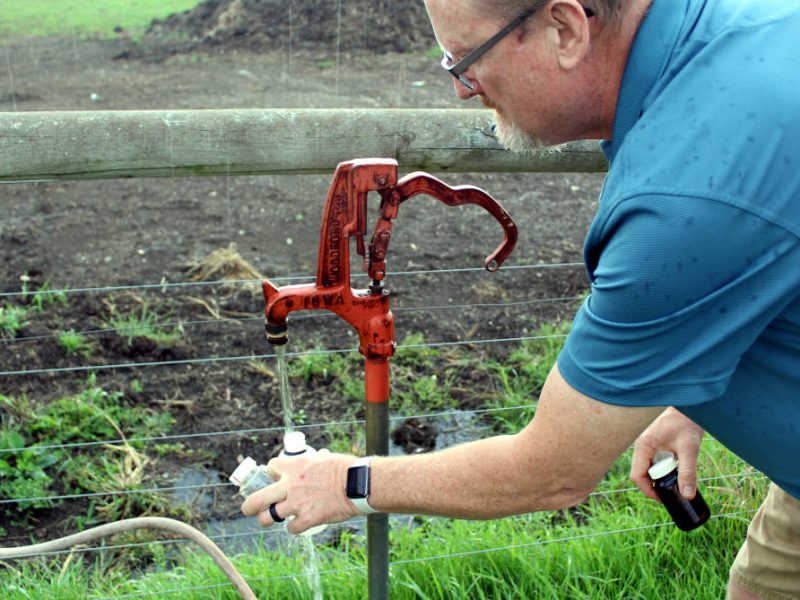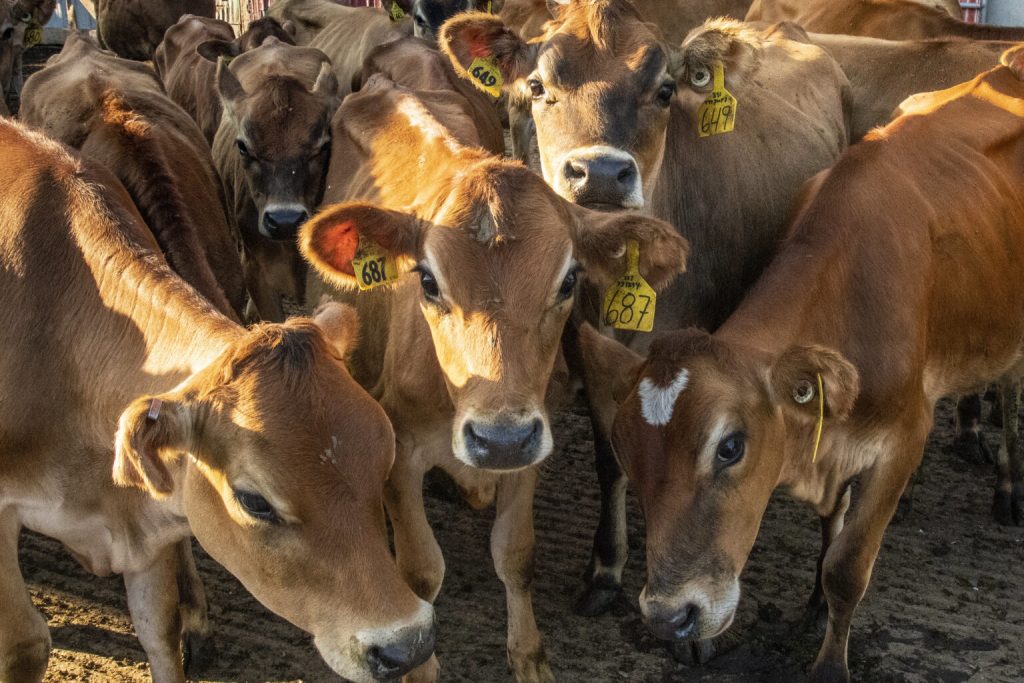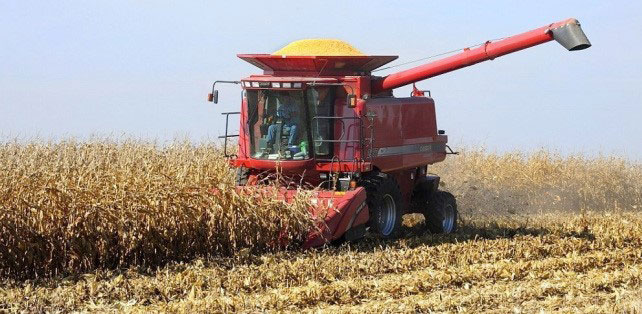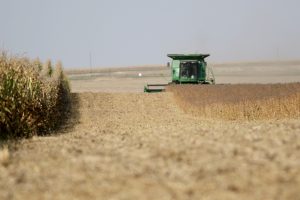CLICK HERE for the latest market quotes from the Iowa Agribusiness Network!
CLICK HERE for the latest market quotes from the Brownfield Ag News Network!
CLICK HERE for the latest market quotes from the Iowa Agribusiness Network!
CLICK HERE for the latest market quotes from the Brownfield Ag News Network!
(Radio Iowa) – A study from Iowa State University shows that only five to ten percent of the 230-thousand private well owners in the state test their water annually. Iowa State Extension Water Quality Program Manager Catherine DeLong says one of the barriers to testing is a misunderstanding of what quality well water should be. “I think a lot of the time, private well owners think that if you have a private well, it’s a normal thing to have bacteria, but it really isn’t,” She says. “It means there’s something potentially structurally unsound with the well, that there’s a way for things from the surface to get into the well, so it is something to take seriously.” 
Bacteria, nitrates, and arsenic are the most common contaminants, and have all been detected in Iowa wells. DeLong says testing regularly is important because the impact of the contaminants don’t immediately show up when people drink the water. “With things like arsenic, with things like nitrate, we know that those health effects can really take years to have an effect. They’re odorless and tasteless, so if people have them in their water, they wouldn’t necessarily know unless they get it tested,” Delong says.
Nitrates and arsenic in drinking water have been linked to cancers, cardiovascular issues, and birth defects.
(Decorah, Iowa) – A citizens group has filed a lawsuit against the Winneshiek County Board of Supervisors alleging an improper public hearing and inconsistent application of the county zoning plan, following a decision to grant a zoning change for the operation of an anaerobic digester. The Iowa Capital Dispatch reports in June, Winneshiek landowners submitted an application to rezone an approximately five-acre portion of land from agricultural to industrial use to facilitate two 2.5 million gallon digesters. The digesters would convert manure from Full Bohr and KG4 dairies in Ridgeway into natural gas and pump it into a nearby pipeline.
James Larew, an agent for the citizens group, Driftless Water Defenders, and the attorney who prepared the petition, said the clean water advocacy group spoke against the digester project at the board of supervisors’ meeting Aug. 5th, claiming they pose a “serious threat to clean water,” and that should have been considered by the board of supervisors.
Anaerobic digesters are a controversial waste management tool. Proponents argue they turn an already existing waste product into usable fuel. Opponents see it as an excuse to grow herd sizes and exacerbate existing environmental challenges with concentrated animal feeding operations. Despite public concern and a lack of recommendation from the county zoning commission, supervisors voted 3-2 to rezone the parcel.

A proposal by two northeast Iowa dairies to use an anaerobic digester has sparked a lawsuit. (Photo by Lance Cheung/U.S. Department of Agriculture)
The lawsuit, filed Aug. 30 in the county’s district court, takes issue with the decision and process at the Aug. 5th public hearing. At the hearing, County Auditor Benjamin Steines explained that the Iowa Department of Natural Resources controlled the construction permitting for the project, and therefore the role of the county was merely to decide on the zoning issue. The anaerobic digester would need industrial zoning to operate as intended and process the manure into gas. The proposed digester would produce energy equivalent to 1.5 million gallons of gas, per year, according to Planning and Zoning Commission minutes from the applicant’s presentation, July 9th.
Chair of the Board of Supervisors Dan Langreck repeatedly interrupted public comment to reiterate that comments were to pertain to the zoning request and not the merits or consequences of digesters. Langreck shut down requests from Supervisor Shirley Vermace to “calm it down” and to “stop censoring the public.” The lawsuit against the board alleges it denied the public full and fair opportunity to be heard. The lawsuit also argues the decision is inconsistent with the Winneshiek County Comprehensive Plan. The county zoning commission noted the same reason in its July 16 decision to deny the request for zoning change.
Minutes from the zoning commission meeting show commissioners were also concerned with the possibility of leaks from the project and at having a limited amount of time to evaluate the project. The Zoning Commission report was not provided to Winneshiek residents who attended the hearing, though County Zoning Administrator Tony Phillips told Capital Dispatch that anyone could have requested the document.
The petition asks the court to set aside the board’s decision to rezone and that the board turn over any documents and correspondence between the county and applicants. The Department of Natural Resources issued air quality construction permits for the project on Tuesday, and the Winneshiek County Board of Adjustments approved a Conditional Use Permit for the project Sept. 3.
(Radio Iowa) – The Sierra Club’s Iowa Chapter has filed a lawsuit that seeks to overturn state approval of a permit for the Summit Carbon Solutions pipeline.
In late June the Iowa Utilities Commission issued a permit for construction of the initial route for the carbon pipeline, giving Summit eminent domain authority to seize property from landowners who have not voluntarily agreed to let the pipeline run through their property. The Sierra Club’s Jess Mazour said people who objected to the pipeline did not get a fair hearing before the Iowa Utilities Commission.
“Our evidence was not given the weight that it should have and there’s some serious due process violations,” Mazour said, “but we really have a strong case and we finally get to take our case to court and have an unbiased decision maker.” Wally Taylor, an attorney for the Sierra Club, said the commission incorrectly ruled Summit’s pipeline had a public benefit as a so-called common carrier that may be granted eminent domain authority.
“It’s like when Walmart has their own semis pick up products from various vendors, put in on the semi and take it to a Walmart store, once it gets in that Walmart truck, it’s Walmart’s property,” Taylor said. “That Walmart truck is not a common carrier.”

Jess Mazour has been the Sierra Club Iowa Chapter’s conservation program coordinator for the past four years.
Taylor said the lawsuit cites other “misstatements of fact and faulty legal conclusions.” Mazour said the commission’s decision was not unexpected after Governor Reynolds replaced the commission’s chairwoman and appointed another commission member in the spring of 2023. “From that minute on, the process was sped up,” Mazour said. “They moved deadlines sooner than what we had been told by the former board.”
The Sierra Club is arguing the Iowa Utilities Commission showed a pattern of favoritism to Summit and contempt for pipeline opponents during the public hearing about the project that stretched over 25 days last fall. “We were expected to go through security and we couldn’t bring in water to the hearing or food, but yet Summit could go in the back door and had their lunch catered in and had coffee,” Mazour said. “It’s just little things like that throughout the whole process that it’s very obvious this new board had their mind made up.”
Five Iowa counties, landowners who object to the pipeline and nearly 40 Republican legislators have filed separate appeals. Summit Carbon Solutions issued a statement earlier this week, saying the company is confident in the Iowa Utilities Commission’s thorough review process. Summit, ethanol producers and Iowa Corn Growers have argued the carbon pipeline will help grow markets for ethanol in the U.S. and abroad and benefit farmers.
After plans were pulled for a separate Navigator CO2 pipeline, Summit has begun the process of seeking another state permit to extend its pipeline to ethanol plants that initially signed on to join the proposed Navigator pipeline.
(Radio Iowa) – Some Iowa farmers are already firing up their combines to start harvesting crops. Angie Rieck Hinz, a field agronomist for Iowa State University Extension and Outreach, says it’s a bit early, but “There are a few farmers who are taking out some corn and even some beans in a few places here in central Iowa.”
While Iowa came completely out of a four-year drought this spring with steady rains, it’s been much drier lately and about two-thirds of the state is now considered “abnormally dry” on the drought monitor map. Rieck Hinz says that can be an advantage at this time of year.
“The heat, coupled with those dry conditions, is going to push that maturity on those crops a little bit faster,” she says. “We still need to wait for crops to dry down in some cases, but it’s been relatively dry for the last month compared to how we started off the growing season.”

Combine harvesting corn. (ISU Extension photo)
There’s a very dry patch in north-central Iowa, from roughly the Webster City area to Iowa Falls, where Rieck Hinz says they’re more than three inches below average on rainfall for the past 40 days or so. “Dry weather is always great conditions for harvest,” she says. “We can get big machinery in and out of those fields. We don’t have to worry about soil compaction. We’re not fighting mud. Let’s hope it stays that way. So the weather can both hurt us and help us at the same time when we get to harvest.”
Forecasters say there’s a chance for some rain over the weekend in parts of the state, and again in the middle of next week.
(Radio Iowa) – Iowa Congresswoman Ashley Hinson says farmers should be wary of agricultural drones manufactured in China and sold in the U-S by a company called D-J-I. “Every farmer needs to be eyes wide open about the technology they are currently using on their farms,” Hinson says. There are nearly 10-thousand registered agricultural spray drones in the U.S. today and Hinson says many of those were made by D-J-I, which has ties to the Chinese military.
“They have sophisticated sensing technology designed to help monitor the health of crops and direct the spray to the appropriate area,” Hinson says, “but that also means that these drones are actively collecting granular level detail on our ag industry that can be weaponized by the CCP.” Hinson says that means the C-C-P — the Chinese Communist Party — could have leverage over the U-S food supply, making this a national security issue.
D-J-I says it has no ties to the Chinese military and any ban on its products would deprive U-S farmers of the benefits D-J-I spray drones offer. D-J-I is the world’s largest drone manufacturer and 80 percent of the consumer drones sold in the U-S were made by D-J-I. This week, the House passed a bill that would ban all *future* D-J-I drone models from operating in the United States.
“Communist China is the most significant threat to the United States’ security, economy and global leadership,” Hinson says. “For decades the U-S has taken, frankly, a delicate approach to our relationship with communist China, and hoping that if we bring them into the rules based international order that they would act accordingly.”
Hinson says appeasing China hasn’t worked and it’s time to change tactics. Hinson, a Republican from Marion, is a member of the House Select Committee on the Chinese Communist Party.
(Iowa News Service) – Alternative energy advocates say Iowa is making significant progress on reaching its green power goals by 2035. The state has become a national leader in wind production. The Iowa Environmental Council took the unusual step of hosting a “Condition of the State” webinar to announce the areas where Iowa is making progress on reaching its alternative energy goals.
Steve Guyer, energy policy counsel for the commission, said solar and wind top the list. “Overall, in 2019, we actually started generating more wind in the state than we actually got from our coal plants in the state,” Guyer pointed out. “That actually is continuing, where the coal plant generation is going down and wind is going up.”
Iowa is among the nation’s leading producers of wind energy, despite pushback from some farm groups. Guyer added beyond the economic benefits of alternative energy, there are air and water quality implications too, both of which he said have improved with the increase in green power.

Guyer noted reducing emissions from fossil fuel-fired power plants has a dramatic effect on crop production in Iowa. He cited a 10-year study showing the effects of closing specific coal-powered facilities. “Some of those plants were actually Iowa-based plants,” Guyer emphasized. “They saw a marked increase in production after the closure of those plants. The theory is that the sun basically is being blocked, and so, if it had the sunlight that wasn’t being blocked, it would produce more. So yes, coal plants definitely are impacting corn production.”
Iowa is getting help from the federal Inflation Reduction Act to invest in alternative energy sources. However, the report said none of the utilities in Iowa are taking what it calls “adequate steps to achieve a carbon-free energy sector by 2035.”
(Radio Iowa) – The Hamilton County Supervisors this (Tuesday) morning approved a resolution objecting to eminent domain for the Summit Carbon Pipeline that will be coming through the county. Rick Young of Jewell read a portion of the resolution and says using eminent domain for a carbon pipeline for private benefit is not appropriate and should never be done.
“People in Iowa work way too hard for their to earn their money, to pay for their property, to have somebody come along and say, I want to use it. I want to dig it up and damage your property just because I want to put a pipeline through,” he says. Young says the pipeline will do other damage as well. “With all the drainage we have in our county, you go for the pipeline through and think that you’re not going to hurt drainage, you’re going to hurt drainage because it’s all going to settle differently,” Young.
Hamilton County Supervisor Jerry Kloberdanz shared his opinion on the rejection of eminent domain. “Hamilton County Boards of Supervisors objects to the use of eminent domain for private economic gain and urges the Iowa Utilities Commission not to grant Carbon Solutions and their affiliates the use of eminent domain for this project,” he says.
Summit Carbon Solutions is holding informational meetings on the expansion its project in Titonka today (Tuesday). Summit has information meetings scheduled in Butler and Floyd Counties for Wednesday.
(Radio Iowa) – A salmonella outbreak linked to recalled eggs has sickened at least 65 people in 24 states, including Iowa. A map on the Centers for Disease Control website shows up to three Iowans were among those linked to the outbreak by the end of last week. The eggs — which have been recalled — came from an egg operation in northeast Wisconsin. The eggs were sold in stores under the brand names Milo’s Poultry Farms and Tony’s Fresh Market eggs and also distributed to restaurants in Illinois, Wisconsin and Michigan. 
Doctors say you can feel sick within 12 hours or up to three days after eating food that has salmonella. Symptoms can last up to seven days. At least two dozen people linked to the recalled eggs from Wisconsin were so sick they were hospitalized, but no deaths have been reported.
(Atlantic, Iowa) – Enrollment is open for Cass County 4-H, and the active, learn-by-doing approach is now more accessible to Iowa’s youth than ever. Cass County ISU Extension County Youth Coordinator, Katie Bateman says “4-H is a year-round program for youth in grades kindergarten through 12. Enrollment is free in Cass County thanks to support towards our Cass County 4-H Endowment Fund. Research has shown that young people in 4-H are nearly four times as likely to contribute to their communities and are twice as likely to engage in Science, Technology, Engineering and Math (STEM) programs during after school time.”
4-H is uniquely poised to help youth develop life skills such as public speaking, self-motivation, healthy lifestyle choices, emotional intelligence, conflict management, and negotiating. These skills may be a key indicator of future career success when paired with the hard skills often taught in academic settings.
Members will join a 4-H that that has monthly meetings to complete community service, recreation, along with a 4-H business meeting to talk about upcoming 4-H events offered in the county. Families are encouraged to attend meetings with their kids to enhance their learning and sense of belonging in the group. “When you join 4-H, you become part of the Cass County 4-H family. Youth make friends in their own club and across the county at different events!” shared Bateman “Having the whole family participating in club meetings makes it easier for youth members to get involved and gain all the learning benefits 4-H has to offer.”

Cass County Clover Kid Graduates – 2023
Youth may join 4-H at any time in the year, however a new program year begins in September. We recommend that you enroll early in the year to have the maximum experience possible. Workshops, camps, ad special events happen throughout the calendar year. To get enrolled in Cass County 4-H visit us at 805 W 10th Street in Atlantic, call 712-243-1132 or check out the website, https://www.extension.iastate.edu/cass/join-4-h.
If you have questions, or your child is interested in joining 4-H, please contact the Cass County Extension Office at 712-243-1132, or visit the Cass County Extension website at www.extension.iastate.edu/cass.
Cass County 4-H has more than 300 4-H youth and 100 volunteers involved in the program.
(State News/Iowa Capital Dispatch) – Crop conditions for corn, soybeans and pasture are far better than conditions from this time last year, with over 75% of corn and soybeans and 63% of pasture rated as good or excellent, according to the U.S. Department of Agriculture’s weekly crop progress and condition report for the state. Only 44-46% of corn and soybeans and 15% of pasture cropland rated good or excellent this time last year. Nearly all corn has reached the dough stage or beyond. The percentage of mature corn in the state doubled from 10% last week, setting it four days behind last year, but only one day behind the five-year average.
Soybeans are similarly maturing, with 95% setting pods and nearly 9% dropping leaves. Like this year’s corn, soybeans lag four days behind last year’s crops. A report from USDA in August forecasted corn yields for the state would be up eight bushels per acre from last year, soybean yields would improve by three bushels per acre. In preparation for harvest season, Gov. Kim Reynolds issued a proclamation on Monday waiving the need for a permit on overweight trucks bearing agricultural products.
More than 40% of the state, primarily in northern and western Iowa, is in abnormally dry conditions according to the U.S. Drought Monitor, but the state’s crop progress report shows that around 70% of topsoil and subsoil moisture is adequate. Statewide average temperatures the past week were 6.3 degrees below normal, with north eastern regions of the state seeing some overnight lows in the upper 30s, according to State Climatologist Justin Glisan.

A farmer harvests soybeans in western Iowa in early October 2023. (Photo by Jared Strong/Iowa Capital Dispatch)
The lower temperatures also gave farmers 6.4 suitable days for field work such as cutting hay and chopping corn silage.